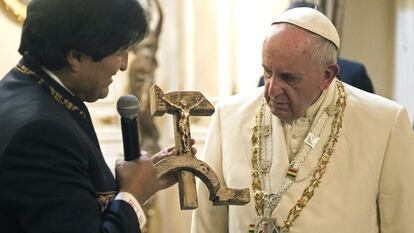Pope gives his backing to Morales’ social programs in Bolivia
Pontiff reported to have sipped coca-based tea before reaching high-altitude destination President hopes Francis will offer to mediate in border conflict with Chile

Almost as soon as Pope Francis landed in Bolivia on Wednesday, he voiced words of praise for President Evo Morales and his social reform programs. The pontiff’s visit to the country marks the second leg of a tour of South America, during which government officials hope he will offer to mediate in an ongoing border conflict with neighboring Chile.
“How beautiful are countries that rise above that unhealthy mistrust of one another, welcome those who are different, and make integration a new factor for development,” the pope said on arrival at El Alto International Airport, outside of La Paz.
How beautiful are countries that rise above that unhealthy mistrust of one another”
The airport’s high altitude – some 4,100 meters above sea level – appeared to have no immediate effect on the health of the 78-year-old Argentinean-born pontiff.
According to Reuters, which quoted a flight attendant on board the pope’s Alitalia airliner, the pontiff drank a tea made of a mix of coca leaves, chamomile and anise seeds to ward off any altitude sickness before reaching La Paz from Ecuador, where he began his official three-nation visit, which will end in Paraguay.
Many Bolivians chew coca leaves to combat the effects of altitude sickness, which is known as soroche in the Andean country.
Morales, an Amaya Indian who was a coca-grower before he entered politics, presented Pope Francis a small knitted Indian bag, known as chuspas in Quechua, where natives traditionally carry their coca leaves for chewing while they are out in the fields.
Morales also gave the pope a crucifix forged in the shape of a hammer and sickle.
In a short speech, Morales made a brief reference to the land-locked country’s legal battle with Chile to seek an outlet to the Pacific Ocean.
“Welcome, our brother pope, to this part of a great nation, which has been severed from the sea,” the president said. The outdoor speech was cut short due to concerns that the high winds and altitude could affect Francis on his two-day stay. As a young man, Jorge Mario Bergoglio had part of a lung removed due to an infection.
“All issues – thorny as they may be – have shared, reasonable, fair and lasting solutions,” Pope Francis said. “And, in any case, there isn’t any reason for aggression, anger or making enemies, which only serve to aggravate the situation and make it more difficult to resolve the problem.”
Then he added: “Yes, I am thinking about the sea. Dialogue, dialogue.”
All issues – thorny as they may be – have fair and lasting solutions”
The International Court of Justice at The Hague is currently weighing up arguments made by Bolivia and Chile in their long-running battle over parts of northern Chilean territory that the Bolivian government had to give up following the 19th-century War of the Pacific.
Bolivia is demanding that Chile begin negotiations over the La Paz government’s claims for an outlet to the Pacific Ocean, but Chilean lawyers said that Bolivian diplomats in 1904 agreed to give up those claims on the signing of the peace treaty that officially ended the conflict, which lasted from 1879 to 1883.
The court at The Hague is expected to issue a ruling later this year.
It wasn’t clear whether the Vatican will step in to mediate the dispute. But recently, the Catholic University in Argentina, where one of the pontiff’s closest aides, Archbishop Víctor Manuel Fernández, serves as dean, called together a group of intellectuals from Bolivia, Chile and Peru to come up with a solution to the border conflict.
English version by Martin Delfín.
Tu suscripción se está usando en otro dispositivo
¿Quieres añadir otro usuario a tu suscripción?
Si continúas leyendo en este dispositivo, no se podrá leer en el otro.
FlechaTu suscripción se está usando en otro dispositivo y solo puedes acceder a EL PAÍS desde un dispositivo a la vez.
Si quieres compartir tu cuenta, cambia tu suscripción a la modalidad Premium, así podrás añadir otro usuario. Cada uno accederá con su propia cuenta de email, lo que os permitirá personalizar vuestra experiencia en EL PAÍS.
¿Tienes una suscripción de empresa? Accede aquí para contratar más cuentas.
En el caso de no saber quién está usando tu cuenta, te recomendamos cambiar tu contraseña aquí.
Si decides continuar compartiendo tu cuenta, este mensaje se mostrará en tu dispositivo y en el de la otra persona que está usando tu cuenta de forma indefinida, afectando a tu experiencia de lectura. Puedes consultar aquí los términos y condiciones de la suscripción digital.








































